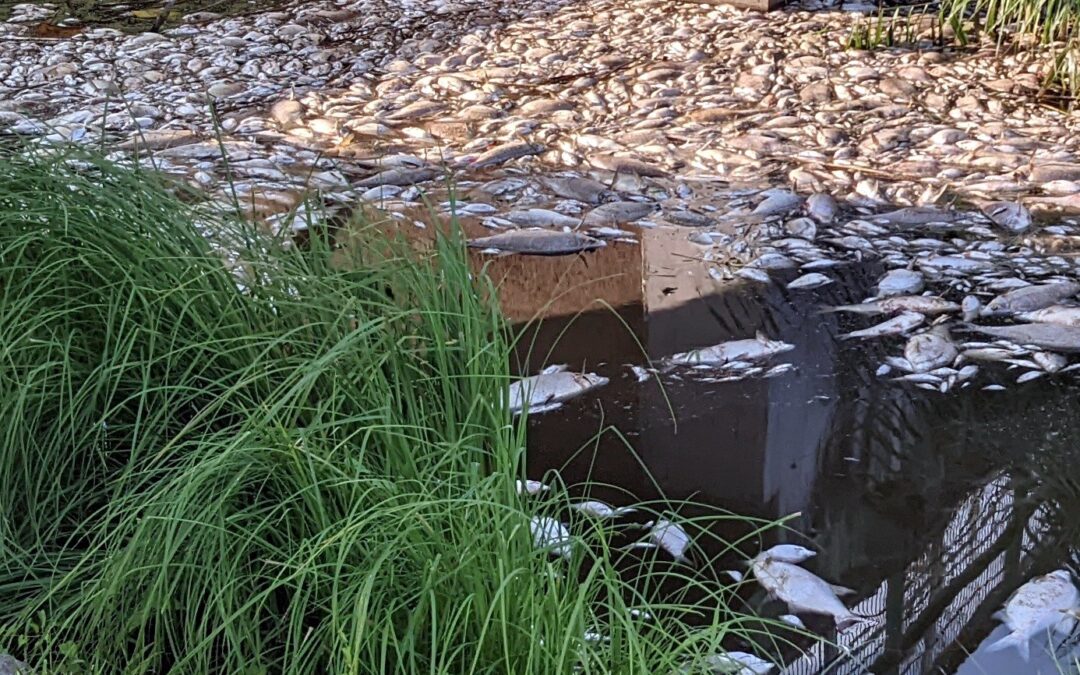Poland’s climate ministry has informed prosecutors of potential crimes by officials under the former government, who failed to implement a water monitoring system promised after an environmental disaster on the Oder river in 2022.
The catastrophe resulted in the death of over half the river’s fish, according to estimates, and led Poland’s then Law and Justice (PiS) government to announce planned improvements in the monitoring and protection of waterways.
Zawiadomienie do prokuratury w sprawie monitoringu Odry https://t.co/BwW7UAVZhj
— Ministerstwo Klimatu i Środowiska (@MKiS_GOV_PL) August 7, 2024
However, the current leadership of the climate ministry – part of a new government that replaced PiS in December – claims that when they took over none of the 800 planned monitoring points on the Oder had been built.
“We found zero working measurement probes, zero sanitary techniques that the ministry had previously mentioned and zero environmental alerts,” said deputy climate minister Urszula Zielińska on Wednesday.
She added that a pilot system providing 24-hour monitoring of the Oder promised under the previous government was also nonexistent. “The monitoring system existed only on paper,” she said.
Sorry to interrupt your reading. The article continues below.

Notes from Poland is run by a small editorial team and published by an independent, non-profit foundation that is funded through donations from our readers. We cannot do what we do without your support.
Zielińska also accused the previous authorities of financial mismanagement, noting that 250 million zloty (€57.9 million) was planned to be spent on the Oder monitoring programme whereas the budget for the national monitoring programme for all surface waters costs the state 98 million zloty.
She claimed that the ministry’s former leadership had paid out 52 million zloty in advance to the contractor for the new monitoring programme that went unaccounted for.
She added that the contract was concluded with an entity that had “never before” been involved in building such a project. The ministry suspended payments in May this year.
In relation to its findings, the ministry this month notified prosecutors of the potential offences of officials failing to fulfil their duties and exceeding their powers when concluding agreements relating to the monitoring system and supervising its implementation.
Last year's environmental disaster in the Oder river resulted from "years of inaction and mistakes" by the Polish authorities, says the state audit office.
It also found that failings in the government's response to the crisis made the situation worse https://t.co/8bsnRMzVNA
— Notes from Poland 🇵🇱 (@notesfrompoland) November 16, 2023
In November last year, Poland’s state auditor published a report that identified numerous failings by the then government and other state authorities that hampered the response to the disaster on the Oder.
Various investigations have found that the ultimate cause of the mass die-off was algal blooms that produced toxins that damaged the ecosystem. But an EU report notes that industrial waste entering the water was a “key factor” leading to the catastrophe.
The type of algae that previously led to the mass die-offs were again found last weekend in Dzierżno Duże lake and the Gliwice Canal (which connects to the Oder river). Nearly ten tonnes of dead fish have been retrieved from these two bodies of water since Saturday.
“The condition of Polish surface waters is very bad,” admitted Zielińska on Wednesday.
Germany says Poland is not doing enough to protect the Oder after a new report found that over half the river's fish died off due to last year’s environmental disaster.
But a Polish government official says Germany is spreading disinformation https://t.co/gOQ0HReJvN
— Notes from Poland 🇵🇱 (@notesfrompoland) June 29, 2023
Main image credit: Hanno Böck/Wikimedia Commons (under CC BY-SA 4.0)

Alicja Ptak is senior editor at Notes from Poland and a multimedia journalist. She previously worked for Reuters.



















